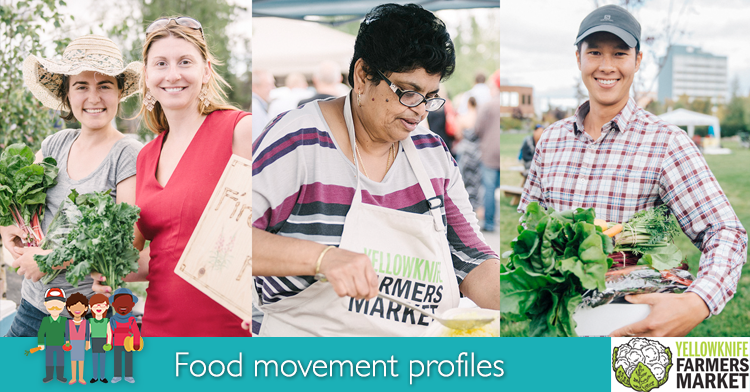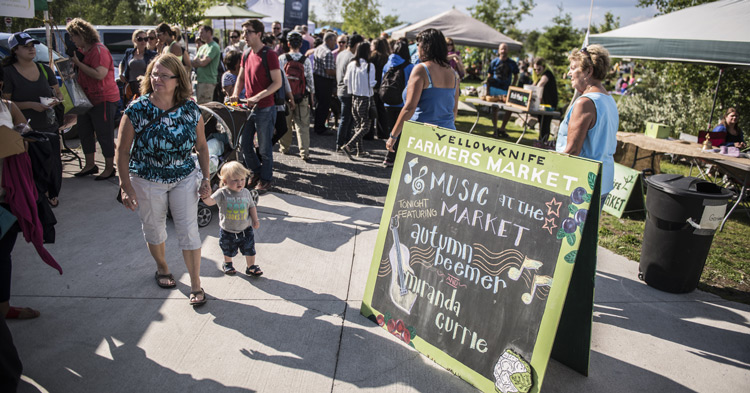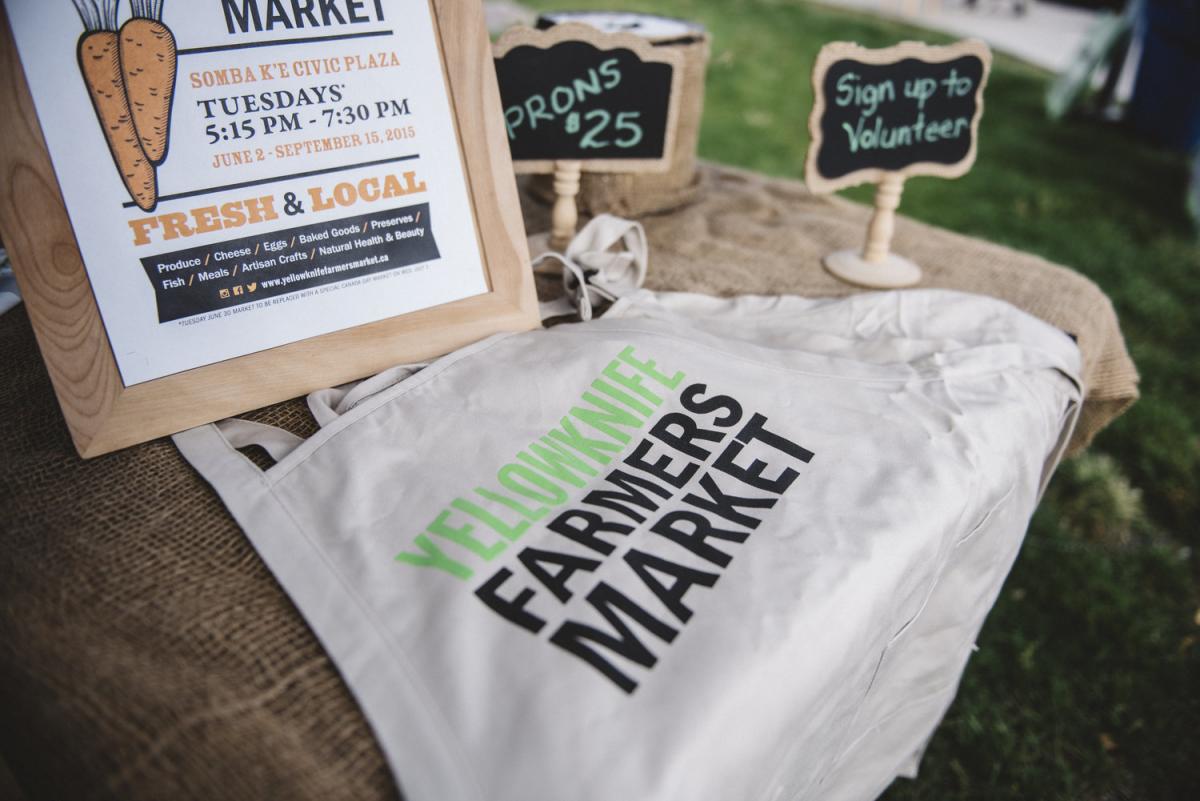Yellowknife Farmers Market: One of the Great Food Organisations We Love to Support

The Food Movement Profiles series supports and highlights the work of Food Secure Canada members across the country. Our amazing members work daily to strengthen the food movement and create more just, healthy and sustainable food systems. As a pan-Canadian alliance of organizations and individuals, we are working together to advance food security and food sovereignty.
Today we are thrilled to interview France Benoit, Chairperson (Vendor) of the Yellowknife Farmers Market, a non-profit society formed in 2013 to promote and grow the local food system in Yellowknife.
Food Secure Canada (FSC): Tell us more about Yellowknife Farmers Market’s mission.
 France Benoit: The Yellowknife Farmers Market (YKFM) is a non-profit society formed in 2013 to promote and grow the local food system in Yellowknife. The Summer Tuesday Market is a natural byproduct of this vision. The market is up and running during 16 weeks in the year, plus one week around Christmas time.
France Benoit: The Yellowknife Farmers Market (YKFM) is a non-profit society formed in 2013 to promote and grow the local food system in Yellowknife. The Summer Tuesday Market is a natural byproduct of this vision. The market is up and running during 16 weeks in the year, plus one week around Christmas time.
The YKFM inspires and nurtures a healthy community by building a local, sustainable and Northern food economy in a vibrant, diverse and inclusive market place. The Market provides a venue for economic exchange and a marketplace for Yellowknifers to purchase locally baked, cooked, processed and harvested goods.
The organization is guided by three objectives, with the Market being just one of them:
1. To facilitate the Yellowknife Farmers Market;
2. To support food based economic development; and
3. To support the development of local food systems.
Now we are a great success story in Yellowknife! We have around 900-1000 people coming every week, and surveys determine that people come 3 weeks out of the month, which is a huge commitment from Yellowknifers. We have local musicians during the 2 hours of the market, free activities for the kids in collaboration with the city and even a tent for nursing mothers.
FSC: We hear a lot about healthy and sustainable food nowadays. What is your definition of “good food”?
France Benoit: We are so diverse and spread out in Canada- each city has its own flavour and melding of cultures. Surely, people would be surprised to find out that Yellowknife is also an extremely diverse city, where you will find an agglomerate of various cultures. From First nations, Inuit, to Filipino, Korean, African and Vietnamese communities. In fact, over 100 languages are spoken in Yellowknife. To me, good food has to meet that test of being culturally appropriate for all. For example, traditional, Indigenous cultures have their own food-ways, and it is important to keep in mind that they are routinely hunting, fishing and trapping.
Because everything is imported in Yellowknife and that we have very limited stores and restaurants, very often any culturally appropriate food has a price tag attached to it. My final components of “good food” are of course that the food is accessible and affordable, healthy, nutritious and locally produced- always bringing in community and economic elements into the discussion.

How do you see food as a solution to the challenges that we face today?
France Benoit: Food is the heart and soul of our community. Access to fresh, nutritious food is a foundation for health and human dignity. Food is the great equalizer, rich or poor, healthy or unhealthy. Food can lead us onto a more sustainable path. Through the farmer’s market, we are accomplishing some of that; we look at food from a broader perspective.
One of the things that vendors are doing at the market, since we were cut off from growing our own food for 50 years after a road to Alberta was put in, is getting reacquainted to food culture and finding a role into this food culture, relearning skills that were lost (such as cooking in large quantities, preservation of the food, or going to harvest the food). For that, we have so much to learn from the First Nations who continue to do that, and are truly privileged to be living with them. We are also reacquainting ourselves with the skills that were lost and not used for a long time, and acquiring new skills around marketing and vending. Ultimately, to see yourself not just as a food grower, but as somebody who can set up a business.
FSC: What is innovative about Yellowknife Farmers Market’s approach to promote public engagement and a more sustainable food system?
France Benoit: In terms of public engagement, we have often been told that we helped with the social integration of new immigrant families into Yellowknife, who by being involved at the market, have felt engaged in their community by making a little bit of money, while making something they were knowledgeable about. It brings them a sense of pride to present their products to their new community, which besomes an enlarged family. The market is an event where everyone has a sense of belonging, where they can discover different foods. We believe positive human connections and cooperation allow our community to flourish and grow. By combining innovation and industriousness we achieve our best while making our market fun, inclusive and a beautiful reflection of our land.
The YKFM plays a central role in creating a just and sustainable food system and in fostering an economically, ecologically, culturally and socially sustainable community. The market has been defining local food for Yellowknife and the Northwest Territories while still having that ability to service and in the same breath, deal with the food security issues in territories. We try to envelop all the different manifestations of what local food can mean to people in the Northwest Territories.
FSC: How do you think we can best support a vibrant food culture?
France Benoit: Food is the glue that ties us all together. The market allows Yellowknife residents to understand the value of supporting the local economy by purchasing locally grown food and supporting locally made products. Thus, sustainable farming and local food production expand as more people choose to enter these professions. Relationships between vendors and consumers grow, nourish and inspire community, while sharing critical knowledge and creating conversations required to initiate progress towards sustainability.

FSC: Yellowknife Farmers Market is an organizational member of Food Secure Canada. We work together for deep and lasting change in our food system. How do you see a national food policy? Will it help you achieve your mission?
France Benoit: One of the great challenges that we face in the Northwest Territories is that half of the population lives in Yellowknife, and the rest live in 30 very small rural communities spread out throughout the territory, which creates a great divide. We are continuously facing the conundrum of Yellowknife versus the communities or Yellowknife versus the territory, and now we are adding in that national aspect. This issue of access to nutritious food is one that is across the country, which may look different in the Northwest Territories but is still a valid challenge that everybody is facing. I think we have a lot of things in common, although we have differences. Certainly, as we develop a local food strategy, we will try to tie it into a NFP, and it will definitely help us achieve our mission. We see ourselves at the first stage of building and working towards food security in Yellowknife.
FSC: How can we get involved with Yellowknife Farmers Market?
France Benoit: The Farmers Market would not be possible without the dedication of many volunteers. We have a variety of volunteer positions available, both at the market or behind the scenes: You can email us with your interest here!
1. We are always looking for volunteers to help with, for example, the composting program at the market or supporting the Market Manager in various ways.
2. Through the Food Charter Coalition and in collaboration with all levels of government, we are always seeking for individuals and groups supporting the mission of developing a more just and sustainable food system for Yellowknife by the development of a local food strategy. We are very much looking at it through the food systems lens (the production of food, the distribution of food, the waste of food, and the nutritional aspects).
3. As part of our produce strategy, we are finding creative ways to bring more local produce into the market. It can very much look like enticing Yellowknifers to sell their excess produce. We might need a volunteer who would go from place to place to pick up the extra produce offered by Yellowknifers, cleaning it, bagging it, pricing it, and bringing it to the market. Because we don’t have much arable land in Yellowknife, part of the solution will also be to try to engage the main food growers in Hay River, where they definitely have more agriculture going on.
4. The Northern Farm Training Institute in Hay River will be setting up a CSA box system (*Community Supported Agriculture Box: weekly box of produce). We are hoping to get funding to have a number of these CSA boxes for young low-income families, and also offer them various tools like cooking demonstration classes with different topics of discussion around health and nutrition. We will most likely need volunteer support on this project.
- Log in to post comments


